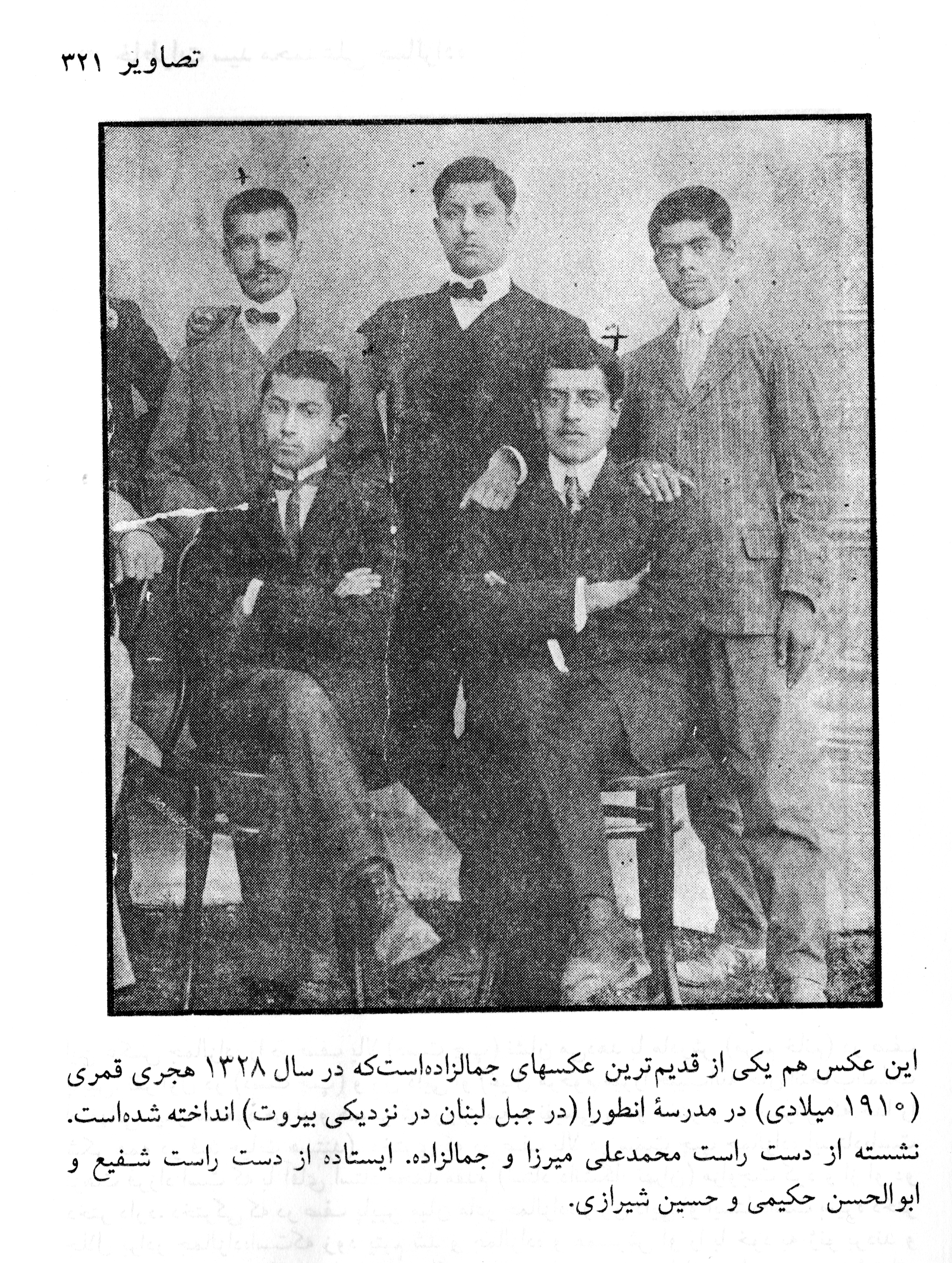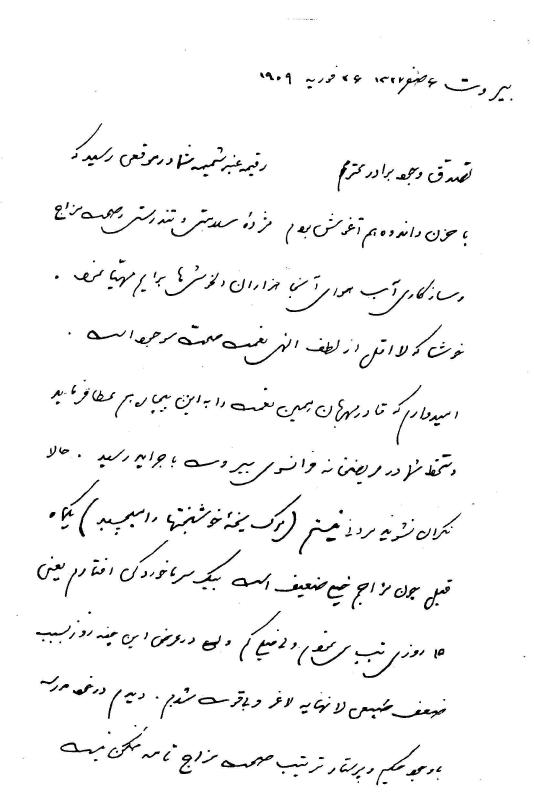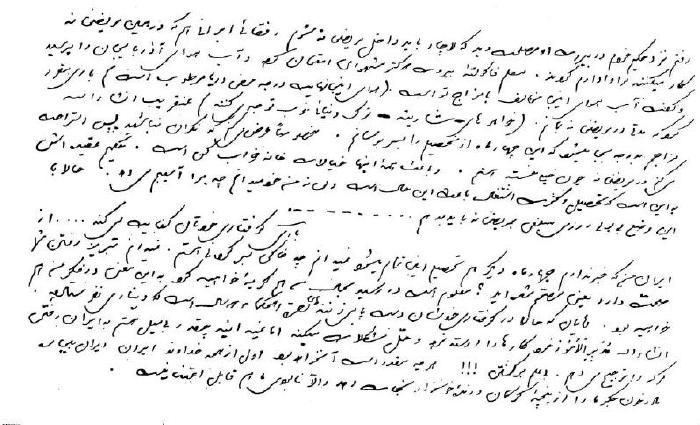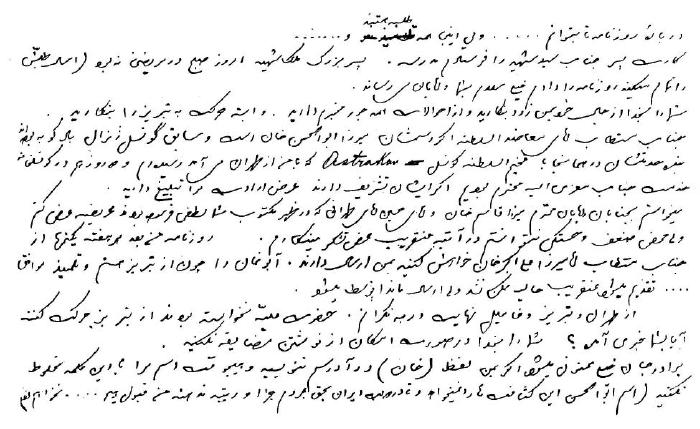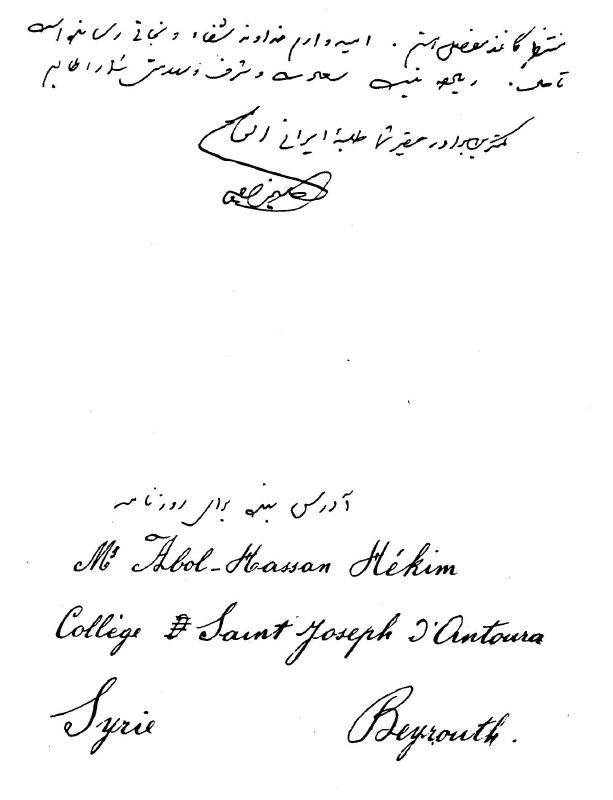Addendum 2014
In 2014 I was discussing with Connie Bobroff the life of the famous Iranian writer Mohammad Ali Jamalzadeh the father of modern Persian story telling and prose. Connie Bobroff is an Iranian Studies researcher with a particular interest in the life and works of Jamalzadeh who had helped earlier by providing valuable scanned copies of Abolhassan Hakimi's articles in Kaveh. We were reviewing some new facts I had found in an article written by M. Farzaneh for the Iranian online magazine Mad o Meh about the relationship between Jamalzadeh and the genius of modern Persian prose, Unfortunately teh Mad o Meh site was redesigned but the link to the article in Persian via the Wayback Machine is here. Sadegh Hedayat. Once such revelation by Farzaneh was that Abolhassan Hakimi had been instrumental in finding his old schoolmate a job in the International Labour Organisation and the Iranian Secretariat at the League of Nations in Switzerland. It solved an old mystery as how the the schoolmates had ended up in Switzerland as work colleagues. So we started looking more at the school they had attended. Jamalzadeh in one of several autobiographical articles had mentioned the name of the Jesuit school in Lebanon, namely Antoura. I later found that he had named most of these schoolmates in a eulogy he wrote for Ebrahim Pourdavood.
Massound Gharajedaghi had given me a copy of a letter from AH convalesing in a hospital in Beirut to his brother EH in Tehran. It was published in a book in Iran. I decided to review the letter by AH in case I had missed some facts. Many years ago when I first read it, it did not seem interesting. I also knew much less about our modern history and although I had read Jamalzadeh since childhood I had never delved into his life and Times. It was in 1908 that the constitutional revolution and the newly established parliament faced the gravest challenge by the new Qajar shah.
The historical background is key to understanding its significance as it was written in the aftermath of what in the history of the constitutional revolution is called the Minor Dictatorship when Mohammad Ali Qajar became Shah and with the help of Russian Cossack officers in charge of the Iranian army tried to roll back democracy and the constitutional movement bombarding the parliament. A civil war ensued resulting in his dethronement and much strife for Iranians. The Hakimi's fought actively in the constitutionalist camp. Ebrahim was elected as member of the National Committee running the country till a government could be formed.
In the beginning of the third page of the letter, AH mentioned he had given the card Ebrahim had sent that to the son of the "Martyred Seyyed". I guessed that this person must have been none other Mohammad Ali Jamalzadeh whose father Seyyed Jamal e Din was a fiery preacher and supporter of the Constitutional Movement. Seyyed Jamal e Din was imprisoned and murdered on the orders of Mohammad Ali Qajar during the Minor Dictatorship. Jamalzadeh was sent to Beirut about the time his father was arrested. I asked Connie and she agreed that this person is none other than Jamalzadeh. Given her interest in Jamalzadeh she initiated a more serious look at the letter by transcribing it. Having kicked off the whole thing it would have been bad manners if I did not contribute. So I started helping and it soon became an exercise in history of constitutional revolution, and Qajar era writing style as we struggled to decipher his handwriting and some of the unfamiliar expressions.
Amazingly she identified the next person referred obliquely as the "Son of Martyr Malek" to be Mehdi Malekzadeh son of Malek ol Motakelemin who was Seyyed Jamal e Din's friend also a fiery revolutionary also imprisoned and murdered on the orders of Mohammad Ali Qajar. Mehdi Malekzadeh had attended the same school and was studying medicine in Beirut. He later gained fame as the author of a history of the Constitutional Revolution. I carefully checked the dates which required quite a few searches and errors in reporting and converting of Jamal e Din's year of death from Lunar Arabic Calendar in use at the time. Suffice to say having checked the date of the letter with what we know about the lives of Mohammad Ali Jamalzadeh and Mehdi Malekzadeh there is no doubt they have been correctly indentified.
AH enigmatically refers to The Gentlemen after discussing Jamalzadeh and Malekzadeh. He was still being cautious given earlier events and civil war. Who were these Gentlemen? Why had Ebrhim send a card to Mohammad Ali Jamalzadeh? Was it a name card? Was it a form of correspondence? We may never know. My theory is the National Committee, had an interest in the fate of these two young men (by providing either financial, or moral assistance).
The transcript is followed by the image files in Persian. Last but not least it is with sincere thanks to Siamak Nikopour who checked our work and consulted with Mr Mahvelati a calligrapher to decipher some of the handwriting neither of us could not read.
Hamid, Singapore, 2014
بیروت ۶ صفر ۱۳۲۷ ۲۶ فوریه ۱۹۰۹تصدّق وجود برادر محترمم رقیمه عنبر شمیمه شما در موقعی رسید که با حزن و اندوه همآغوش بودم. مژدهی سلامتی و تندرستی و صحت مزاج و سازگاری آب هوای آنجا هزاران دلخوشىها برایم مهیّا نمود. خوشا که لااقل از لطف الهی نعمت صحت موجود است.
امیدوارم که قادر مهربان همین نعمت را به این بیچاره هم عطا فرماید دستخط شما در مریضخانه فرانسوی بیروت با جراید رسید. حالا نگران نشوید مردنی نیستم (مرگ یخهی خوشبختها را میچسبد) یکماه قبل چون مزاجم خیلی ضعیف است بیک سرما خوردگی افتادم یعنی ۱۵ روزی تب مینمودم. ولی خیلی کم و در عرض این چند روز بسبب ضعف طبیعی لانهایه لاغر و بیقوت شدم. دیدم درخود مدرسه با وجود حکیم و پرستار ترتیب صحت مزاج تامه ممکن نیست.
رفتم نزد حکیم خودم در بیروت او مصلحت دید که لاچار باید داخل مریضخانه شوم. رفقای ایرانی هم که در همین مریضخانه کار میکنند مرا وادارام کردند. معلم فاکولتهی بیروت دکتر مشهورى امتحان کرد و آب هوای آذربایجان را پرسید و گفت آبهوای اینجا مخالف با مزاج تو است. (هوای اینجا نهایت درجه محض دریا مرطوب است) باری مقرر کرد که مدتی در مریضخانه بمانم. (خواهرهاى -شاریته - ترک دنیایی خوب توجه میکنند) عنقریب انشالله مزاجم بدرجه بجا ميشود كه اين چهارماه از تحصيلم را بسر برسانم. خصوصا ً عرض میكنم كه نگران نباشيد. پس استراحت میكنم در مريضخانه چون خيلى خسته هستم. و باعث همهی اينها خيالات خانهخرابكن است. حكيم عقيدهاش به اين است كه تحصيل و کثرت اشتغال باعث اين حالت است. ولى نه، من خود ميدانم چه مرا آسيبم ميدهد. حالا با اين وضع بىپولى روزى مبلغى به مريضخانه بايد بدهم-------------------
بارى گرفتارى خودتان كفايت مى كند.... از ايران من كه خبر ندارم . چهارماه ديگر هم تحصيلم اينجا تمام ميشود نميدانم چه خاكى بسركردنى هستم. نميدانم تبريز شما رفتن شما صحت دارد يعنى مصمّم شده ايد؟ معلوم است در رسيد بجانب من هم گریهی خواهيد كرد به اين معنى در فكر من هم خواهيد بود. آقايان كه حالا در گرفتاری خودشان دست پا می زنند. آقای نصرت الحكماء دو سال است كه ديناری نفرستاده. انشالله مدبرالانور[1] خود كارها را درست نموده و حلّ مشكلات ميكند. اما نميدانيد چقدر بی ميل هستم به ايران رفتن مرگ را ترجيح ميدهم . بی علم برگشتن![2] هرچه مقدر است آن خواهد بود[3]. اول از همه خداوند ايران ويران بيچاره مادر خون جگر مارا از پنجۀ گرگان درندهی خونخوار نجات دهد، والّا نابودی ما هم قابل اعتنا نيست.
درباره روزنامه تا بتوانم...... ولى اينجا همه طلبه هستند و .....
کارت پسر جناب سید شهید[4] را فرستادم مدرسه. پسر بزرگ ملك شهيد[5] امروز صبح در مريضخانه بود. (رساله طبش را تمام ميكند. روزنامه را دادم. خيلى سلام به شما و آقایان مى رساند. شما را بخدا از جانب خود بمن زود بنگاريد و از احوالات همه جور مخبرم داريد. و البته حركت به تبريز را بنگاريد.جناب مستطاب آقاى معاضد السلطنه اگراسمشان میرزا ابوالحسن خان است و سابق گنسول ژنرال بادكوبه بوده اند، بنده خدمتشان در همانجا با فخيم السلطنه كنسول [6]Astrakan كه با من از طهران مى آمد، رسيده ام و دو روز هم در كنسولخانه خدمت جناب معزى اليه محترم بوديم، اگر ايشان تشريف دارند، عرض ارادت مرا تبليغ داريد.
ميخواستم به جنابان آقايان محترم ميرزا قاسم خان و آقاى حسين آقاى طهرانى كه در ظهر مكتوب شما لطفى فرموده بودند عريضه عرض كنم ولى محض ضعف و خستگى نتوانستم، در آتيه عنقريب عرض تشكر مينگارم. روزنامه مِن بَعد هرهفته یکنمره از جناب مستطاب آقاميرزا على اكبرخان[7] خواهش كنيد بمن ارسال دارند. آبونمان را چون از تبريز هستم و تلميذ موافق .... تقديم ميشود، عنقريب حاليه ممكن نشد ولى ارسال مانداپوسط[8] ميشود.
از طهران و تبریز و فامیل نهایت درجه نگرانم. حضرت علّیه نخواسته بودند از تبریز حرکت کنند.
آیا به شما خبری آمده؟ شما را بخدا در صورت امکان از نوشتن مضایقه نکنید.برادرجان خیلی ممنون میشوم اگر بمن این لفظ (خان) در آدرسم ننویسید و هیچوقت اسم مرا با این کلمه مخلوط نکنید (اسم ابوالحسن این کثافتها را نمیخواهد و تا در دولت ایران بحق بمردم جزاء و رتبه[9] ندهند من قبول هیچ ....... نخواهم نمود
منتظر کاغذ مفصلی هستم. امیدوارم خداوند شفاء و نجاتی رساندهاست
تاحال زیاده نیست.[10] سعادت و شرف و سلامتی شما را طالبم
کمترین برادر حقیرشما طلبهی ایرانی
ابوالحسن حکیمی
آدرس بنده برای روزنامه
Mr Abol-Hassan Hékim
Collége Saint Joseph L’Antoura
Syrie, Beyrouth.
[2] مرگ را ترجيح ميدهم به بی علم برگشتن!
[3] هر چه مقدر است آن خواهد شد
[4] محمد علی جمالزاده نویسنده شهیر ایرانی که در مدرسه آنطوره (عربی عينطورة) لبنان . منظور از شهید پدر نامبرده سید جمال الدین واعظ بود که دراستبداد صغیر به دستور محمد علی قاجار به در زندان او را کشتند.
[5] باید «مهدی ملکزاده» نویسنده کتاب تاریخ انقلاب مشروطه فرزند «ملک المتکلمین» و همدوره جمالزاده و حکیمی در مدرسه بالا. بانو کانی بابراف او را شناسائی کردند. «ملک» باید ملک المتکلمین باشد. «شهید» چون وی همزمان با جمال الدین واعظ دستگیر و او هم به دست جلاد های محمد علی قاجار به شهادت رسید. خاطرات محمد علی جمالزاده در لبنان (سوگواری برای یک دوستی شصت ساله؛ نشریه وحید؛ دی 1347؛ شمارۀ 61)
[6] Astrakhan
[7] پسر میرزا محمود حکیمالملک نخست – پسر عموی او
[8] مانداتپوسط یا ماندات پست: Mandat Postفرانسه به معنای حواله پستی
[9] «جزاء و رتبه» اصطلاح قانونی یا فقهی؟ حقوق بشر؟
[10] یعنی زیاده عرضی نیست
